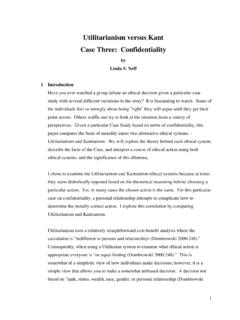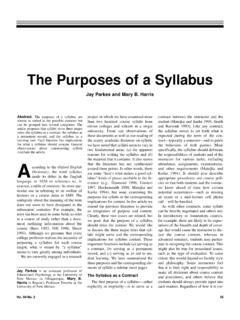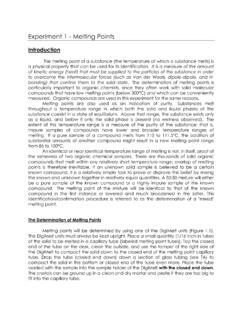Transcription of Can the Subaltern Speak?
1 Can the Subaltern Speak? G ayatri C hakravorty S pivak *. S ome of the most radical criticism coming out of the West today is the result of an interested desire to conserve the subject of the West, or the West as Subject. The theory of pluralized subject-effects' gives an illusion of undermining subjective sovereignty while often providing a cover for this subject of knowledge. Although the history of Europe as Subject is narra- tivized by the law, political economy, and ideology of the West, this concealed Subject pretends it has no geo-political determinations.' The much publicized critique of the sovereign subject thus actually inaugurates a Subject.. This S/subject, curiously sewn together into a transparency by denega . tions, belongs to the exploiters' side of the international division of labor. It is impossible for contemporary French intellectuals to imagine the kind of Power and Desire that would inhabit the unnamed subject of the Other of Europe.
2 It is not only that everything they read, critical or uncritical, is caught within the debate of the production of that Other, supporting or critiquing the constitution of the Subject as Europe. It is also that, in the constitution of that Other of Europe, great care was taken to obliterate the textual ingredients with which such a subject could cathect, could occupy (invest?) its itinerary - not only by ideological and scientific production, but also by the institution of the law.. In the face of the possibility that the intellectual is complicit in the persistent constitution of Other as the Self's shadow, a possibility of political practice for the intel . lectual would be to put the economic under erasure,' to see the economic factor as irreducible as it reinscribes the social text, even as it is erased, however imperfectly, when it claims to be the final determinant or the tran.
3 Scendental signified. The clearest available example of such epistemic violence is the remotely orchestrated, far-flung, and heterogeneous project to constitute the colonial * From Can the Subaltern Speak?' in Cary Nelson and Lawrence Grossberg (eds). Marxism and the Interpretation of Culture London: Macmillan, 1988. 24. CAN THE Subaltern SPEAK? subject as Other. This project is also the asymetrical obliteration of the trace of that Other in its precarious Subjectivity. It is well known that foucault locates epistemic violence, a complete overhaul of the episteme, in the redefi . nition of sanity at the end of the European eighteenth century. But what if that particular redefinition was only a part of the narrative of history in Europe as well as in the colonies? What if the two projects of epistemic overhaul worked as dislocated and unacknowledged parts of a vast two-handed engine?
4 Perhaps it is no more than to ask that the subtext of the palimpsestic narra . tive of imperialism be recognized as subjugated knowledge,' a whole set of knowledges that have been disqualified as inadequate to their task or insuffi . ciently elaborated: naive knowledges, located low down on the hierarchy, beneath the required level of cognition or scientificity' ( foucault 1980: 82). This is not to describe the way things really were' or to privilege the narrative of history as imperialism as the best version of history. It is, rather, to offer an account of how an explanation and narrative of reality was established as the normative one.. Let us now move to consider the margins (one can just as well say the silent, silenced center) of the circuit marked out by this epistemic violence, men and women among the illiterate peasantry, the tribals, the lowest strata of the urban subproletariat.
5 According to foucault and Deleuze (in the First World, under the standardization and regimentation of socialized capital, though they do not seem to recognize this) the oppressed, if given the chance (the problem of representation cannot be bypassed here), and on the way to solidarity through alliance politics (a Marxist thematic is at work here) can speak and know their conditions. We must now confront the following question: On the other side of the international division of labor from socialized capital, inside and outside the circuit of the epistemic violence of imperialist law and education supplementing an earlier economic text, can the Subaltern speak? .. The first part of my proposition - that the phased development of the Subaltern is complicated by the imperialist project - is confronted by a collective of intellectuals who may be called the Subaltern Studies' group.
6 They must ask, Can the Subaltern speak? Here we are within foucault 's own discipline of history and with people who acknowledge his influence. Their project is to rethink Indian colonial historiography from the perspective of the discontinuous chain of peasant insurgencies during the colonial occupation. This is indeed the problem of the permission to narrate' discussed by Said (1984). As Ranajit Guha argues, The historiography of Indian nationalism has for a long time been dominated by elitism - colonialist elitism and bourgeois-nationalist elitism .. shar[ing] the prejudice that the making of the Indian nation and the development of the consciousness-nationalism which con . firmed this process were exclusively or predominantly elite achieve . ments. In the colonialist and neo-colonialist historiographies these achievements are credited to British colonial rulers, administrators, 25.
7 GAYATRI CHAKRAVORTY SPIVAK. policies, institutions, and culture; in the nationalist and neo-nationalist writings - to Indian elite personalities, institutions, activities and ideas. (Guha 1982: 1). Certain varieties of the Indian elite are at best native informants for first- world intellectuals interested in the voice of the Other. But one must nevertheless insist that the colonized Subaltern subject is irretrievably heterogeneous. Against the indigenous elite we may set what Guha calls the politics of the people,' both outside ( this was an autonomous domain, for it neither originated from elite politics nor did its existence depend on the latter') and inside ( it continued to operate vigorously in spite of [colonialism], adjusting itself to the conditions prevailing under the Raj and in many respects developing entirely new strains in both form and content').
8 The circuit of colonial production (Guha 1982: 4). I cannot entirely endorse this insistence on determinate vigor and full autonomy, for practical historiographic exigencies will not allow such endorsements to privilege Subaltern consciousness. Against the possible charge that his approach is essentialist, Guha constructs a definition of the people (the place of that essence) that can be only an identity-in-differential. He proposes a dynamic stratification grid describing colonial social production at large. Even the third group on the list, the buffer group, as it were, between the people and the great macrostructural dominant groups, is itself defined as a place of in-betweenness, what Derrida has described as an antre' (1981): 1. Dominant foreign groups. elite 2. Dominant indigenous groups on the all-India level. 3. Dominant indigenous groups at the regional and local levels.
9 4. The terms people' and Subaltern classes' [are] used as synony . mous throughout [Guha's definition]. The social groups and elements included in this category represent the demographic difference between the total Indian population and all those whom we have described as the elite.'. Consider the third item on this list - the antre of situational indeter . minacy these careful historians presuppose as they grapple with the question, Can the Subaltern speak? Taken as a whole and in the abstract this .. category .. was heterogeneous in its composition and thanks to the uneven character of regional economic and social developments, different from area to area. The same class or element which was dominant in one area .. could be among the dominated in another. This could and did create many ambiguities and contradictions in attitudes and alliances, especially among the lowest strata of the rural gentry, impoverished landlords, rich peasants and upper middle class peasants all of whom belonged, ideally speaking, to the category of people or Subaltern classes.
10 (Guha 1982: 8). 26. CAN THE Subaltern SPEAK? The task of research' projected here is to investigate, identify and measure the specific nature and degree of the deviation of [the] elements [constituting item 3] from the ideal and situate it historically.' Investigate, identify, and measure the specific': a program could hardly be more essentialist and taxonomic. Yet a curious methodological imperative is at work. I have argued that, in the foucault -Deleuze conversation, a postrepresentationalist vocabulary hides an essentialist agenda. In Subaltern studies, because of the violence of imperialist epistemic, social, and disciplinary inscription, a project understood in essentialist terms must traffic in a radical textual prac . tice of differences. The object of the group's investigation, in the case not even of the people as such but of the floating buffer zone of the regional elite- Subaltern , is a deviation from an ideal - the people or Subaltern - which is itself defined as a difference from the elite.









